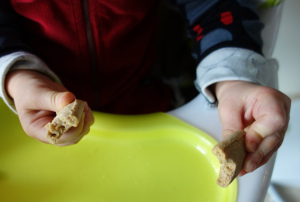I love this expression - perhaps I should say ‘diagnosis’ - because it captures so evocatively the difficulty of a particular phase of childhood. It’s not a syndrome in the technical sense of the word, obviously, more a kind of tongue-in-cheek shorthand for a psychological phenomenon. Trust me, though: my first son suffered from it and it felt very real indeed. From about 10 months to 2.5 years old, this kid could not stomach a broken biscuit, literally or figuratively.
You know the scene. The biscuit comes out of the box in pieces or apart in the artless hands of the child trying to eat it and the shit hits the fan. Hard. I have a friend whose wife called him up from the local Starbucks, screeching into the phone for him to come immediately, the pitch of hysteria in the background so high he couldn’t help but think there was grave bodily harm involved. He arrived, out of breath and in a panic, to find that the only injury sustained was to a recently purchased cookie. Horror of all horrors: it had broken. And on the floor next to it, flailing, was his 23 month old daughter.
I have seen ‘broken biscuit syndrome’ explained in two different ways. One explanation is that the biscuit becomes the straw that breaks the camel’s back. A toddler’s life is about making sense of a world that doesn’t always make sense. So many rules to master, so many conventions to internalize and all of them conveyed with an inevitable degree of inconsistency. ‘No’s run legion, lines are drawn - sometimes arbitrarily, sometimes not - and these little people just do not have the emotional wherewithal to handle every setback that comes their way. They can cope with the first thing on a given day that falls to pieces, but not necessarily the last. This is the biscuit. It represents one upset too many.
This explanation has merit as a description of the general way in which small children struggle for control over their environment. But it doesn’t explain the significance of the biscuit itself. Not every kid goes crazy when the cookie crumbles. I realized this one day when I found my second son, no more than 14 months old, hunched purposefully in the corner of the kitchen. He had found an old cookie on the floor, which somebody must have stepped on, and was rhythmically shoveling the pulverized pieces into his mouth. He didn’t care how many parts it came in so long as they all ended up in his tummy. Other things sent this boy over the edge, fair enough, but never, not once, the lack of a perfect circle.
Which leads me to believe that there is something about the idea of wholeness that matters to some children and not to others. This is the second explanation. I read about it once, of course I can’t remember where now, and it makes perfect sense of the difference between son number one and son number two. The first was a worshipper at the altar of order. From the time he was old enough to move on his own steam, his play consisted of the systematic organization of everything that crossed his path. He was repetitive, he was fastidious, he liked the world around him to be just so. And when it wasn’t, as it isn’t some of the time, he lost it. The broken biscuit was, for him, the ultimate indignity. My second son, on the other hand, was far more resilient and flexible at that age. If anything, he seemed to thrive on disorder. Give him a breadstick in two bits and he would play the drums with them, not burst into tears.
Broken biscuit syndrome is no fun for the kid, to be sure. It might be indicative of certain personality traits that will follow him into adulthood or it might simply be a blip in his development that will fade away as he acquires a larger armory of coping skills. The person it affects the most while it is happening, rather, is the parent. Not because he or she has to spend a period of time riding out the storms of a toddler’s rage, though there is definitely that. But because it is an early - and powerful - symbol of the reality that there are some things in your child’s life that you simply cannot fix. Cookies, both real and metaphorical, will continue to break for him and you will not be able to put them back together. Such is their nature. All you can do is hope that the kid learns to pick up the pieces for himself.



I would be very interested to learn what part birth order plays in this phenomenon. My older son too was far more concerned with order (obsessively so) and my younger son was not in any way bothered. Is it because they are born into a world naturally more chaotic than the first born? They witness the mess and the broken biscuits- literally and metaphorically- from the start and so view it as normal?
Christopher used to line up his toys in perfect and worryingly precise designs. Each toy exactly the same distance from the last. If anyone disturbed their position, he was compelled to go over and right the wrong. Matthew has seemingly never created physical order in his 3.5 years. That isn’t to say he doesn’t have his particular obsessions (the child pulls off his shirt if his sleeves get a few drips on them during hand washing) but order is not one of them.
Then I had a thought that maybe as a person, as a parent, that values cleanliness and order myself, was I busy trying to maintain that order more after the birth (and interruption of order) of my first? I was certainly more fastidious in my past than I am now. Most certainly I had given up keeping every surface just so by the time number 2 came along. Was I more concerned about cookies breaking with number one than number 2?
So difficult to discern cause and effect here re pecking order. I can’t help but think that being a first child is a strong indicator of likelihood. Does anybody out there have a second ( or subsequent) child who experienced this? Please weigh in!
You have a way with words, my friend!
Thank you, Deb, you are so kind!
This is my 3 1/2 year old to a T. Even the way he plays! Any tips from your experience. I can’t seem to help him see that it really is okay that his cookie is broken, blocks fell down, banana broke ( just to name a few). My second son is just the opposite ( carefree, yay my cookie broke! More pieces to eat now!)
My broken-biscuit child is almost nine now! He is still intense and linear and likes things to be just so. But he can also eat a crumbling cookie when required, thank goodness. They do grow out of it, in other words, as they are better able to understand the world and control their reactions to it (though the causal traits never wholly disappear!). The best I can suggest is simply to support him when he is in crisis mode. Nothing you can tell him right now will convince him that a broken biscuit isn’t dire, you won’t be able to talk him round. Rather, you just have to be there and validate his concern (‘I know it makes you upset/doesn’t feel nice/right that the banana broke’), and at the same time set whatever limits you need to in order to make life liveable (‘but I’m sorry you can’t have a new one’). Good luck!
Glad to know it gets better! I can definitely support him through it. He is about to start pre school. I hope his teacher will too!